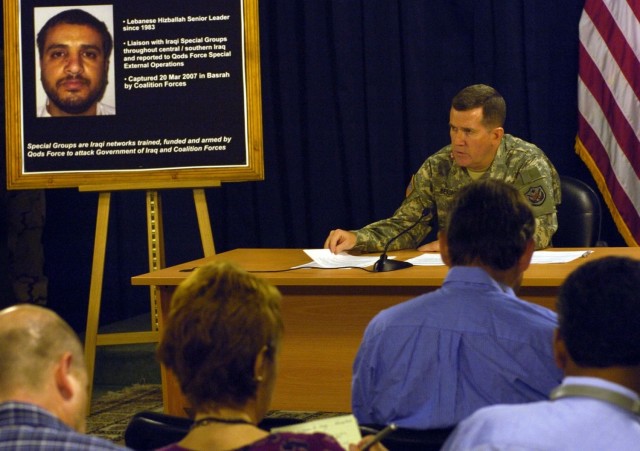WASHINGTON (American Forces Press Service, July 3, 2007) - While al Qaeda in Iraq remains the main enemy in the country, coalition and Iraqi forces are increasingly targeting groups whose training, funding and supplies come from Iran, a spokesman for Multinational Force Iraq said yesterday.
Brig. Gen. Kevin Bergner also said Iran is funding Hezbollah operatives in Iraq. Hezbollah is a Shiia extremist group based in Lebanon. The terror group has seats in the Lebanese parliament and operates as a shadow government for Shiia areas of that country. Iran trains, supplies and funds that group.
Actions against these Iraqi groups have allowed coalition intelligence officials to piece together the Iranian connection to terrorism in Iraq. Brig. Gen. Bergner said that Iran's Quds Force, a special branch of Iran's Revolutionary Guards, is training, funding and arming the Iraqi groups.
"It shows how Iranian operatives are using Lebanese surrogates to create Hezbollah-like capabilities," Brig. Gen. Bergner said. "And it paints a picture of the level of effort in funding and arming extremist groups in Iraq."
The general said the coalition and Iraqi security forces are working to interdict the flow from Iran of weapons, funding and training.
Brig. Gen. Bergner said these special Iraqi groups have evolved over the past three years into largely rogue elements that use a cellular structure to operate independently.
"In the past few months, since the surge of forces began, Iraqi and coalition forces have conducted a range of operations against these special groups," he said, noting that coalition and Iraqi forces have killed or captured 21 of the higher-level operatives since February.
The groups operate throughout Iraq. They planned and executed a string of bombings, kidnappings, sectarian murders and more against Iraqi citizens, Iraqi forces and coalition personnel. They receive arms -- including explosively formed penetrators, the most deadly form of improvised explosive device -- and funding from Iran. They also have received planning help and orders from Iran, Brig. Gen. Bergner said.
One group leader was Azhar Dulaymi, whom coalition forces killed May 19. Brig. Gen. Bergner said the terrorist led the Jan. 20 attack on the Provincial Joint Coordination Center in Karbala that killed five U.S. Soldiers. Dulaymi worked closely with Ali Musa Daqduq and Qayis Khazali, two men with direct links to Iran.
Coalition forces captured Daqduq on March 20. "He is Lebanese-born and has served for the past 24 years in Lebanese Hezbollah," Brig. Gen. Bergner said. "He was in Iraq working as a surrogate for Iranian Revolutionary Guards Corps Quds Force operatives involved with special groups."
Daqduq, a member of Hezbollah in Lebanon since 1983, served as a bodyguard for Hezbollah leader Sayyad Hassan Nazrullah. He also led Hezbollah operations in large areas of Lebanon, Brig. Gen. Bergner said.
"In 2005, he was directed by senior Lebanese Hezbollah leadership to go to Iran and work with the Quds Force to train Iraqi extremists," the general said. "In May 2006, he traveled to Tehran with Yussef Hashim, a fellow Lebanese Hezbollah and head of their operations in Iraq. There they met with the commander and deputy commander of the Iranian Quds Force special external operations."
Daqduq was ordered to Iraq to report on the training and operations of the Iraqi special groups. "In the year prior to his capture, Ali Musa Daqduq made four trips to Iraq," Brig. Gen. Bergner said. "He monitored and reported on the training and arming of special groups in mortars and rockets, manufacturing and employment of improvised explosive devices, and kidnapping operations. Most significantly, he was tasked to organize the special groups in ways that mirrored how Hezbollah was organized in Lebanon."
Daqduq also helped the Quds Force in training Iraqis inside Iran. "Quds Force, along with Hezbollah instructors train approximately 20 to 60 Iraqis at a time, sending them back to Iraq organized into these special groups," he said. "They are being taught how to use (explosively formed penetrators), mortars, rockets, as well as intelligence, sniper and kidnapping operations."
The Quds Force also supplies the groups with weapons and a funding stream of between $750,000 to $3 million a month. "Without this support, these special groups would be hard-pressed to conduct their operations in Iraq," Brig. Gen. Bergner said.
When captured, Daqduq had detailed documents that discussed tactics to attack Iraqi and coalition forces. "He also had a personal journal that shows his involvement with extremist operations in Iraq," the general said. "His diary also notes meeting with special group members who were targeting other Iraqis and coalition forces in the Diyala province using IEDs, as well as small-arms fire."
Khazali was captured with Daqduq. He was in charge of these groups throughout Iraq since June 2006. He is an Iraqi who worked to develop the Iraqi groups into a network similar to Hezbollah.
"It is important to point out that both Ali Musa Daqduq and Qayis Khazali state that senior leadership within the Quds Force knew of and supported planning for the eventual Karbala attack that killed five coalition Soldiers," Brig. Gen. Bergner said. "Ali Musa Daqduq contends the Iraqi special groups could not have conducted this complex operation without the support and direction of the Quds Force.
"Ali Musa Daqduq and Qayis Khazali both confirm that Qayis Khazali authorized the operation and Azhar al Dulaymi, who we killed in an operation earlier this year, executed the operation."
All of this is counter to pledges Iran has made to the Iraqi government to respect territorial boundaries and work to ease violence inside Iraq, Brig. Gen. Bergner said.
"The government of Iran has committed to help work with the government of Iraq in addressing the security problems in this country," he said. "I think the most clear and important message to take from this is, there does not seem to be any follow-through on the commitment that Iran has made to work with Iraq in addressing the ... destabilizing security issues here in Iraq."


Social Sharing